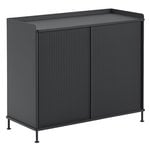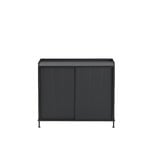Muuto’s Enfold sideboard is characterized by a fine balance of industrial spirit and organic details. Designed by Thomas Bentzen, the Enfold sideboard combines a solid oak base and top with sliding doors made of powder-coated, pleated steel. The lightweight look of Enfold complements both homes and offices and easily finds its place in living rooms, kitchens and hallways alike. The high Enfold sideboard has two metal shelves that can be placed on the desired level behind the sliding doors.


Enfold sideboard, 100 cm, high, black
Muuto
Description
Muuto’s Enfold sideboard is characterized by a fine balance of industrial spirit and organic details. Designed by Thomas Bentzen, the Enfold sideboard combines a solid oak base and top with sliding doors made of powder-coated, pleated steel. The lightweight look of Enfold complements both homes and offices and easily finds its place in living rooms, kitchens and hallways alike. The high Enfold sideboard has two metal shelves that can be placed on the desired level behind the sliding doors.
Product details (6)
- Colour
- Black
- Width
- 99.5 cm
- Depth
- 45 cm
- Height
- 84.5 cm
- Material
- Powder-coated steel, oiled solid oak
- Care instructions
- Clean with a damp cloth
- Product ID
Designer
Thomas Bentzen is a Danish designer who graduated from the Copenhagen Design School in 2003. Bentzen founded his own design office in 2010 and is also part of the Copenhagen REMOVE design group. Before setting up his own office, Bentzen worked for five years at Danish firm Louise Campbell.
Bentzen has worked in various fields of design, ranging from tableware to interior design and from furniture to industrial design. His designs are often characterized by a clear, playful and graphic touch, with an aim to test the boundaries of different materials within the boundaries of form, functionality and sustainable design. Bentzen’s designs have been seen in numerous exhibitions around the world, and he has worked with brands such as Louis Poulsen, Hay and Muuto.
View all productsReviews (0)
Sustainability
The Product Sustainability Framework, our criteria of sustainable design, helps you find the most sustainable products in our selection. Read below which sustainability criteria this product has met.
Working conditions & labour 7/9
-
Equal opportunities for all employees
-
Commitment to UN Global Compact, fair compensation for all employees
-
Corporate responsibility requirements defined and communicated for suppliers
-
Systematic work for improved inclusion and well-being in the workplace
-
Transparent supply chain
-
Suppliers' compliance to a code of conduct ensured
-
Compliance to the UN Guiding Principles on Business and Human Rights ensured in the supply chain
-
Direct suppliers audited and certified
-
Support for community involvement in the supply chain
Eco-friendly production 9/9
-
Fair and resource-wise water-use in production
-
No incineration or landfilling of returned items
-
No use of endangered species as materials
-
No direct environmental emissions or waste (excl. GHGs) from production
-
The sustainability of direct suppliers' production is addressed and monitored
-
Production and material sourcing that respect biodiversity, animal rights, and natural ecosystems
-
Material-efficient and ecological packaging
-
Positive impact on nature’s well-being through operations that regenerate natural ecosystems
-
No potentially harmful chemicals used in own production
Climate impact 4/8
-
Company's direct greenhouse gas emissions identified and commitment to reduction
-
Product's carbon impact identified and commitment to reduction
-
Guidance on energy- and eco-efficient use of the product
-
Contribution to climate initiatives beyond the brand’s direct operations
-
Low-carbon or compensated transportation
-
Carbon footprint of the product calculated and goals set to reduce it
-
100 % renewable energy in own production and operations
-
Carbon neutral or carbon negative product
Sustainable materials 3/6
-
Sustainable and long-lasting material choices
-
No harmful or hazardous substances
-
Responsible raw material sourcing and production
-
Materials suited for circularity: monomaterials, recyclable finishings, renewable or recycled contents etc.
-
Ecological materials: natural, biodegradable, recyclable or recycled contents
-
Outstanding materials in terms of innovativeness, responsibility, sustainability and circularity: local production or sourcing, 100 % recycled content, C2C-certification etc.
Circular design 4/5
-
High aesthetic quality promoting long-term use of the product
-
Technically durable product design and material choices
-
Design for enduring life-long quality
-
Design and support for product maintenance, repair and upgradability
-
Innovative circular design solutions: circular service system, resale platform, remanufacturing, collection of used products, etc.





